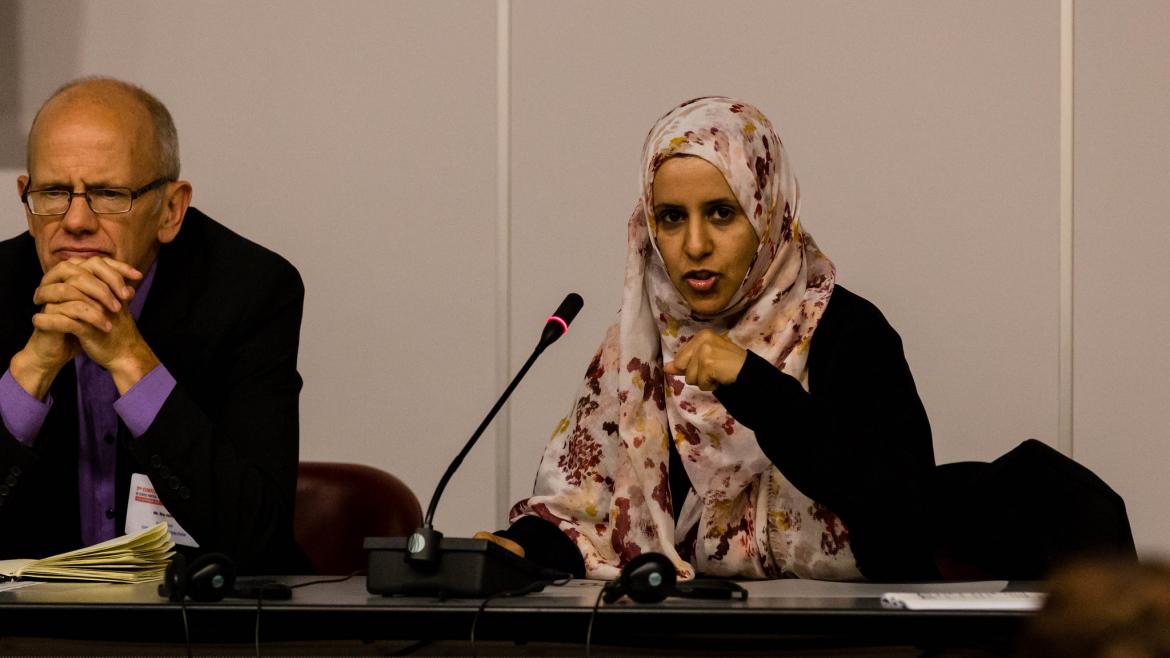In the last six years, a group of 60 people in Yemen have been sifting through bombing wreckage, alert for the tell-tale fragments which will allow an arms expert to identify the weapon used.
For their own safety, most of them work anonymously for Mwatana Organization for Human Rights. The independent organization was created in 2007 at the start of Yemen’s civil war.
In nominating these two organization, the committee highlights the importance to Quakers of the pursuit of truth through meticulous and faithful witness.
This year Quakers nominated Mwatana, together with the UK-based Campaign Against Arms Trade, for the 2021 Nobel Peace Prize. The 2021 Nobel Peace Prize laureate will be announced on Oct. 8.
In nominating these two organization, the committee highlights the importance to Quakers of the pursuit of truth through meticulous and faithful witness. “We were impressed how local efforts on the ground by Mwatana partnered with legal advocacy and policy implementation by CAAT, and how human stories were incorporated into the reports, adding texture and a sense of the reality of loss,” said the nominating committee.
The nominating committee was created after the 1947 Nobel Peace Prize was awarded “to the Quakers, represented by their two great relief organizations, the Friends Service Council in London and the American Friends Service Committee in Philadelphia.” Quaker Peace & Social Witness is the successor to the Friends Service Council. Through this committee, Quakers have the right to nominate candidates for the Nobel Peace Prize.
Mwatana campaigns for freedom of the press, and against war crimes, arbitrary detentions, and forced disappearances. It is credited with having pressed the UN Human Rights Council in 2017 to adopt an international mechanism to investigate violations carried out by all parties to the war in Yemen.
The proxy war in Yemen, between Iran-backed Houthi rebels and a multinational coalition led by Saudi Arabia, has brought about the largest humanitarian crisis in the world. More than 24 million people – some 80% of the population – are in desperate need of aid.
Mwatana campaigns for freedom of the press, and against war crimes, arbitrary detentions, and forced disappearances.
Between 2010 and 2019, the United Kingdom supplied around 19% of Saudi Arabia’s arms imports. In June 2019 Campaign Against Arms Trade, which had sought a judicial review of these arms sales, won its case against the UK government in the court of appeal. Mwatana supplied crucial evidence to the review that UK-made bombs had been found on a number of non-military sites, where civilians, including children, had been killed.
Twelve months later, having come up with a revised methodology for reviewing arms sales, the UK government resumed arms sales to Saudi Arabia and its allies–which promptly rose from £17.5 million to almost £1.4 billion in July-September 2020. In October 2020 CAAT applied for another judicial review. Mwatana’s meticulously researched evidence will clearly continue to be of crucial importance.
Both the UK and the United States, two of the largest global arms exporters, are examining their arms sales to Saudi Arabia. As of January 2021, the United States has temporarily halted its arms sales to Saudi Arabia and increased scrutiny of sales to UAE. This has put more pressure on the UK government. Parliament held an emergency debate in February and its committees on arms export controls is launching an inquiry into compliance and enforcement.
This update was adapted from a blog originally written by the AFSC/QPSW Nobel Peace Prize Nominating Committee as it starts discerning Quaker nominations for the 2022 Nobel Peace Prize. Quaker individuals or organizations can submit nominations through quakernobel.org/nominations.
